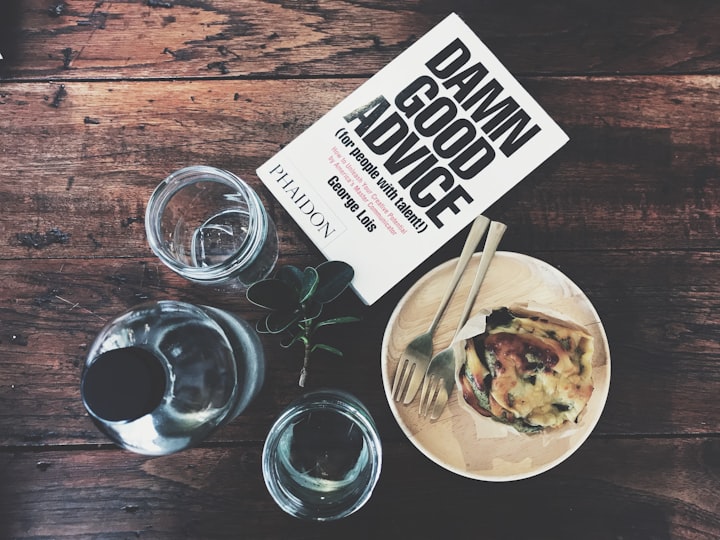
If you want to be a successful writer, you’re probably on the prowl for advice on how to get there. There are thousands of people willing to spew tips and tricks, but you will want to learn how to determine whether the information you’re reading is helpful or harmful to your goals.
There are several ways to determine whether an advice article is credible…
Does the writer have a grasp on great writing skills?

I’m not saying they need to be a clear descendant of Edgar Allen Poe himself, but knowing how to write an article with tact and fluidity is a sign that an author knows what they’re doing.
If a writer has articles filled with grammatical mistakes (I’m talking dozens throughout each article) or has formatting that seems impossible to keep up with, I’d rethink using this person as a credible source for information.
If they aren’t good at writing, they won’t make you better at writing.
It’s simple. If the work in an advice article is shitty, run. Don’t take the advice. Move on and find someone better.
It’s harsh, but it’s the truth. This is a cut-throat industry, and most platforms are highly saturated. Good writers stand out. Follow them.
Make sure you’re not simply basing someone’s credibility off of their follower count

Just because someone has thousands of followers does not mean they know what they’re doing.
It’s not difficult to gain followers. All a person has to do is follow a bunch of people every day.
It doesn’t mean they’re a skilled writer or that they have the experience to back up what they’re saying.
Quality over quantity comes into play here. Do the people following them (not all, but a decent amount) put out good work? Birds of a feather flock together. If someone has a ton of junked-up accounts following them, there might be a reason for that.
Are they a frequent writer, or do they drop in every once in a while?

If a writer isn’t putting a decent amount of effort into writing on Medium, but they stand on a busy corner shouting advice for success on Medium, they aren’t credible in my book.
I can’t advise on a subject I’m barely involved in. The subject is only relevant to a person who is actively participating in it. If they’re not writing frequently, they aren’t developing their craft, and you need to actively seek out mentors who are constantly working towards growing and learning.
Also, writing platforms are always changing. New rules, tools, and features roll out every so often, and if someone isn’t online to see it happen, they may be giving useless tips.
If a partner program recently adopted some changes, and someone hasn’t been on since last May, they may not be giving informed information about how to make money on the platform.
If someone is trying to prove an opinion as fact, be certain their evidence is legit

I say this because I’ve seen it quite a bit lately. Now, I’m not a total dick, so I’m not sharing his article in this… although it’s tempting beyond belief. However, I will give the details of what I witnessed.
This morning I came across an article where a guy was attempting to convince his readers that editing a story after it’s been published will lower your view count.
His evidence?
Well, he posted screenshots of his stats 20 minutes after editing an already-published article, trying to prove his theory that way. 20 fucking minutes. He only waited 20 fucking minutes! I couldn’t believe it.
I’m immediately aware, as are most writers on Medium and many other platforms, that 20 minutes is not enough time to gauge whether or not a system of doing something works or not.
20 minutes? Really?
No.
It takes days, even weeks, to see the true ups and downs on your platform's stat sheet.
If a person is using evidence that makes absolutely no sense, it’s bullshit, and you should run.
His formatting was a mess, over half of the article was rushed and spelled incorrectly, and he was whining. He gave out really bad advice, all because of no change in 20 minutes.
All of the things I hate in one article.
Every single part of it screamed
“Run away. I’m spewing bullshit. Please ignore my bad advice.”
Yet, an eager hoard of people, new writers making up the majority, swarmed to this guy's comment section, thanking him for the advice because they now believe this is a way to make sure your views don’t drop.
I’m thinking to myself…
I really wish these people would ignore this man and find someone with months of evidence that post-published editing really does improve views and interactions. UGHHHH.
We (almost) all know that most writing platforms have a very sensitive algorithm, and those algorithms enjoy being engaged with. The more active you are, the higher your rankings will be.
I was very frustrated because this article encourages a lack of engagement with your own articles.
No one receives any kind of diagnosis, for ANY issue they’re having, within 20 minutes.
Fucking unbelievable.
Be wary if they’re trying to sell you something

Sometimes I feel like I’m walking through a flea market with dozens of money-hungry shop owners reaching at me screaming:
Buy my shit! Buy my shit!
NO.
I don’t want to buy your shit.
If someone’s trying to convince you to purchase their advice that means, usually, that it’s not good enough to be made public.
If what I’ve got is good enough to sell, I wouldn’t be afraid to put a solid amount of it out there as an advertisement. But to the people selling bullshit? They use clickbait and convince you to give your credit card information before even seeing a glimpse of their “one of a kind’ information that made them 12 million dollars on the first day.
When I see a sales tag, I see a red flag.
Keep that in mind.
Sales tag=red flag. 🚩

It’s easy to give advice, and it’s easy to take advice. Just make sure, no matter which side you’re on, that it’s good advice.
If you'd like, you can buy me a coffee :)
About the Creator
Ashleylx
I write what I'm thinking, and sometimes it makes sense.






Comments
There are no comments for this story
Be the first to respond and start the conversation.